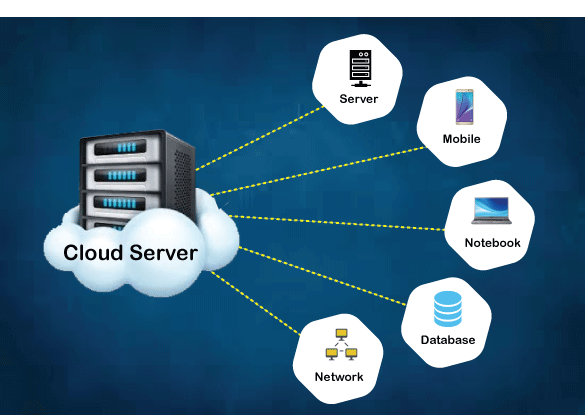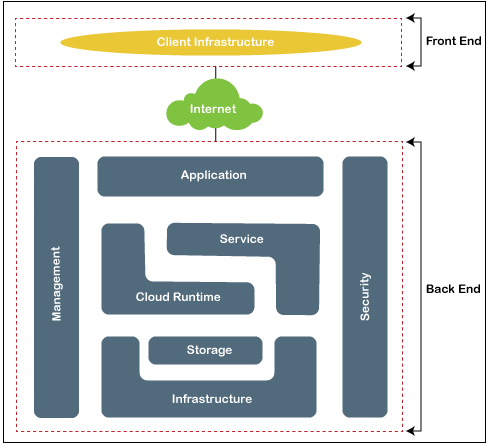Cloud Server
Google upgraded its algorithm in July 2018 to include page load speed as a ranking metric. Consider the consequences if customers leave the page because of load time then the rankings of the page suffer.
Load-time was one of many instances of the significance of hosting services and its effects are on the overall profitability of the company.
Now, let’s disintegrate the distinction between the two key kinds of services provided to understand the significance of web hosting servers: These two servers are: Cloud hosting and dedicated servers.
Each server has certain benefits and drawbacks that may become especially significant to an organization on a plan, meeting time restrictions or looking to develop. The meanings and variations you need to know are discussed here.
Cloud Ecosystem
A cloud environment is a dynamic system of interrelated components, all of which come together to produce cloud services possible. The cloud infrastructure of cloud services is made up of software and hardware components and also cloud clients, cloud experts, vendors, integrators and partners.
The cloud is a technique that is applied to function as a single entity with limitless multiple-servers. As data is stored “in the cloud,” it implies that it is kept in a virtual environment that can pull support from numerous geographically placed physical platforms across the world.
Similarly, the hubs are specific servers that are linked via the opportunity to exchange services in virtual space, mostly in data center facilities. It’s a cloud.

To distribute computing resources, cloud servers support pooled files and folders, including Ceph or a wide Storage Area Network (SAN). Through devolution, hosted and virtual server data are integrated. In the context of a malfunction, its condition can be easily transferred from this environment.
To manage the various sizes of cloud storage that are splintered, a hypervisor is often built. It also controls the assignment of hardware facilities, such as core processors, RAM and storage space, to every cloud server.
Dedicated Hosting System
The dedicated environment for server hosting may not allow usage of virtual technologies. The strengths and weaknesses of a specific item of hardware devices are the foundation of all tools.
The word ‘dedicated’ derives from the fact that, depending on hardware, it is separated from any other physical environment around it. The equipment is deliberately developed to offer industry-leading efficiency, power, longevity and, very important, durability.
What is Cloud Server, and How it works
The on-demand procurement of computer network resources, particularly storing data (cloud services) and computational capability, is cloud computing without explicit, active user intervention. In common, the term describes data centers accessible over the Web to many users. Large servers, over all today, also have operations spread through cloud servers over several environments. If the communication to the user is slightly closer, an edge server can be assigned.
Cloud server hosting is, in basic words, a virtualized storage network.
The core level support for several cloud storage is provided by devices known as bare metal servers. Various bare metal nodes are mainly composed of a public cloud, typically housed in protected network infrastructure for collocation. Multiple virtual servers are hosted by all of these physical servers.
In a couple of seconds, a virtual machine can be built. When it is no longer required, it can also be discarded fast. It is also an easy task to submit information to a virtual server, without the need for in-depth hardware upgrades. Another of the main benefits of cloud infrastructure is versatility, and it is a quality that is central to the cloud service concept.
There will be several web servers within such a private cloud that provide services for the same physical environment. And though each device will be a bare metal server, what consumers invest for and eventually use is the virtual environment.

Dedicated Server Hosting
Dedicated hosting contains the ability to provide a data center with only a specific customer.
All of the server’s facilities are offered to the particular client who leases or purchases the computer equipment. Services are designed to the customer’s requirements, such as storage, RAM, bandwidth load, and processor sort. The most efficient computers in the marketplace are dedicated hosting servers, which most often include several processors.
A dedicated server can need a server network. The cluster is based on modern technology, everyone connecting to a virtual network location for several dedicated servers. After all, only one customer has access to the tools that are in the virtual environment.
Hybrid cloud server (Mixture of Dedicated and cloud server)
A hybrid cloud is named as an incredibly prevalent architecture that several businesses use. Dedicated and cloud hosting alternatives are used in a hybrid cloud. A hybrid may also combine dedicated hosting servers with protected and public cloud servers. This configuration enables several configurations that are appealing to organizations with unique requirements or financial restrictions on the personalization aspect.
Using dedicated servers for back-end operations is one of the most common hybrid cloud architectures. The hybrid servers’ power provides the most stable storage space and communication climate. On cloud storage, its front-end is hosted. For Software as a Service (SaaS) applications, which need flexibility and scalability based on customer-handling parameters, this architecture works perfectly.
Common factors of cloud server and dedicated server
Either dedicated or cloud servers both perform similar required actions through their root. The following software is used with both strategies:
- Keep information preserved
- Request permission for the data
- Queries for information processed
- Return data to the person who needed it.
Differences between hosting services or virtual private server (VPS) services are often preserved by cloud storage and physical hosting.
- Processing large quantities of data without hiccups from delay or results.
- Knowledge reception, analysis and returning to clients with business usual reaction times.
- Protection of the integrity of information stored.
- Ensuring web apps’ efficiency.
Cloud-based systems and dedicated servers of the modern generation have the specific capacity to handle almost any service or program. Using related back-end tools, they can be handled, so that both approaches may execute on similar applications. The differentiation is in the results.
Matching the perfect approach to a framework will save money for organizations, increase flexibility and agility, and help to optimize the use of resources.
Cloud server vs. Dedicated server
While analyzing performance, scalability, migration, management, services, and costing, the variations among cloud infrastructure and dedicated servers become more evident.
1. Scalability
Dedicated hosting ranges separately from servers based on clouds. The classifier model is constrained by the size of stacks or drive-bays of the Distributed Antenna System (DAS) present on the server. Via an existing logical volume manager (LVM) file, a RAID handler, and a connected charger, a dedicated server might be able to communicate a disk to an already open bay. Hot swapping is more complicated for DAS arrays.
Cloud server space, by addition, is readily customizable (and contractible). The cloud server is not always a part of the connection to provide more storage capacity since the SAN is away from the host. In the cloud world, extending capacity does not suffer any slowdown.
Excluding operational downtime, dedicated servers often require more money and resources to update processors. The complete conversion or communicating of another server is necessary for webservers on a single device that needs additional processing capacity.
2. Performance
For a business that’s looking for easy deployment and information retrieval, dedicated servers are typically the most preferred option. Although they manipulate data locally, they may not experience a wide range of delays when carrying out certain operations.
This output pace is particularly essential for organizations, including e-commerce, in which every 1/10th of a second count. To manage information, cloud servers have to go through SAN, which carries the operation through the architecture’s rear end.
The application should also be routed via the hypervisor. This additional processing imposes a certain delay factor that cannot be decreased.
Devices on dedicated servers are dedicated exclusively to the web or software host. They may not require to queue queries until all of the computing capacity is used at one (which is highly doubtful). For businesses with Processor sensitive load balancing operations, this enables dedicated servers an excellent option. CPU units in a cloud system need supervision to prevent efficiency from decaying. Without the need for an additional amount of lag, the existing version of hosts cannot accommodate requests.
Dedicated servers are completely connected to the host site or program, preventing the overall environment from being throttled. Especially in comparison to the cloud storage world, the commitment of this degree enables networking to be a simple operation.
Using the physical network in the cloud system poses a serious risk of bandwidth being throttled. If more than one occupant is concurrently utilizing the same channel, a variety of adverse impacts can be encountered by both occupants.
3. Administration and Operations
Dedicated servers can enable an enterprise to track their dedicated devices. In-house workers also ought to grasp the management of programs more precisely. A business would also need a detailed understanding of the load profile to keep storage overhead within the correct range.
Scaling, updates and repairs are a collaborative endeavor between customers and suppliers that should be strategically planned to keep downtime to a minimum. It will be more convenient for cloud servers to handle. With much less effect on processes, interoperability is quicker.
If a dedicated environment requires scheduling to estimate server needs correctly, cloud services platforms require planning to address the possible constraints that you may encounter.
4. Cost Comparison
Normally, cloud servers contain a lower initial expense than dedicated servers. After all, when a business scales and needs additional capital, cloud servers start losing this benefit.
There are also some characteristics that really can boost the price of cloud and dedicated servers. For example, executing a cloud server via a specific network interface can be very costly.
An advantage of dedicated servers is that it is possible to update them.
Network cards and Non-Volatile Memory (NVMe) drive with more storage, which can boost capacities at the cost of a business’s equipment expenditure.
Usually, cloud servers are paid on a regular OpEx (Operational expenditure) model. CapEx (Capital expenditure) are generally physical server alternatives. They enable you to overwrite the assets at no extra cost. You also have capital investment expenses that can be paid off for a period of 3 years.
5. Migration
Streamlined migration can be attained through both dedicated and cloud hosting services. Migration involves further preparation inside a dedicated setting. The new approach may hold both previous and present progress in view to execute a smooth migration. There should be a full-scale decision made.
In most instances, before the new server is entirely prepared to accept over, the old and new implementations can run simultaneously. Maintaining the existing systems as a backup is also recommended before the latest approach can be sufficiently checked.
